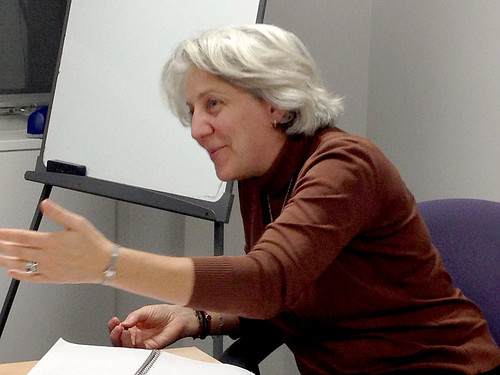Class Report
Spice Up Your Writing Using Culinary History

Teacher: Claudia Kousoulas, writer and food historian (above). Find her at Appetite for Books and @appetitefrbooks.
Documentarian: Holly J. Morris
Location: Washington Post Express conference room
Date: Jan. 14, 2014
Take-home message: “We all eat. It’s a universal notion: We all have this thing that we share, but everybody does it differently. Find your unique thing, couple it with the universal, and then you have the basis of a good story,” Claudia says.
A few examples of what we learned:
The first known restaurant guide, “L’Almanach des gourmands” by Alexandre Balthazar Laurent Grimod de La Reynière, was a product of post-Revolutionary Paris, when fine dining moved from private homes to restaurants.
You can study the historical and cultural roles of food in society at Boston University and depart with a master’s degree in gastronomy.
Church and community cookbooks, originally created to fund Civil War hospitals and veterans, landed the women behind them on church boards, building committees, and in other positions of power. Why? The books made good money.
“Pinguid” means fatty, oily, or greasy.
When describing food or restaurants, try using words not typically applied to such topics. A. A. Gill managed to get “dung,” “froggy,” “proctological,” and “labially” into his Vanity Fair piece on L’Ami Louis — and that’s just in the first four paragraphs.
If your grandmother used Crisco in her pie crust, use Crisco. It won’t be the same otherwise.
There is such a thing as soup dumplings — dumplings with soup inside them! — and you can find them at Bob’s Noodle 66 in Rockville (316 N Washington St.; 301-315-6668).
In the workshop portion of the class, students shared family dishes they remembered fondly from childhood, then pondered how to build personal essays or feature stories around them. Read recipes submitted by students.
Resources, organizations, and further reading:
D.C.-related
- Culinary Historians of Washington, D.C. (CHoW): Meetings are free and open to the public.
- “Historic Restaurants of Washington, D.C.: Capital Eats” by John DeFerrari
- Culinary Historians of Washington Collection at the Smithsonian
- “Dining With the Washingtons” edited by Stephen A. McLeod
Resources
- Radcliffe College’s Schlesinger Library: The collection includes the Julia Child Papers.
- Janice Bluestein Longone Culinary Archive at the William L. Clements Library, University of Michigan: Books, ephemera, magazine, graphics, maps, menus, and diaries ranging from the 16th to 20th centuries.
Books
- “Balzac’s Omelette, A Delicious Tour of French Food and Culture with Honore de Balzac” by Anka Muhlstein
- “The Captain’s Table, Life and Dining on the Great Ocean Liners” by Sarah Edington
- “Consider the Fork, A History of How We Cook and Eat” by Bee Wilson
- “The Cultural Revolution Cookbook” by Sasha Gong and Scott D. Seligman
- “Hoosh, Roast Penguin, Scurvy Day, and Other Stories of Antarctic Cuisine” by Jason C. Anthony
- “Matzoh Ball Gumbo: Culinary Tales of the Jewish South” by Marcie Cohen Ferris
- “The Man Who Changed the Way We Eat: Craig Claiborne and the American Food Renaissance” by Thomas McNamee
- “A Mediterranean Feast: The Story of the Birth of the Celebrated Cuisines of the Mediterranean from the Merchants of Venice to the Barbary Corsairs, with More than 500 Recipes” by Clifford Wright
- “Northern Hospitality, Cooking by the Book in New England” by Keith Stavely and Kathleen Fitzgerald
- “Perfection Salad: Women and Cooking at the Turn of the Century” by Laura Shapiro
- “Secret Financial Life of Food” by Kara Newman
- “Thomas Jefferson’s Creme Brulee” by Thomas J. Craughwell
- “Twain’s Feast” by Andrew Beahrs
- “Modern Food, Moral Food” by Helen Zoe Veit
- “Soul Food: The Surprising Story of an American Cuisine, One Plate at a Time” by Adrian Miller
Journals
- Gastronomica, The Journal of Critical Food Studies
- Petit Propos Culinaire
- Lucky Peach
- Alimentum, The Literature of Food
- Cereal Magazine
- Rocket
- Fricote
- The Carton
Holly J. Morris is an editor/writer from Duluth, Ga. She says “y’all” because it is the English language’s best attempt at a plural second-person pronoun, not because she is Southern. KCDC recruited her for this reason and kept her because she’s so amazing at spreadsheets. She runs on Cheerwine.
